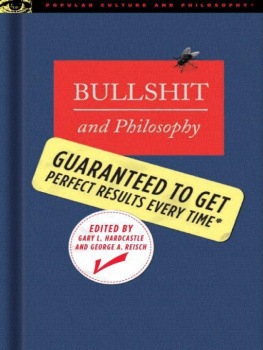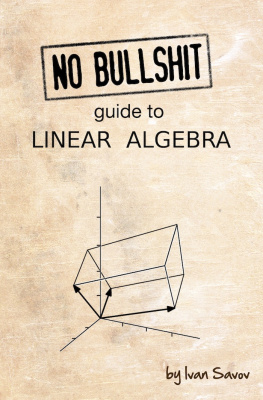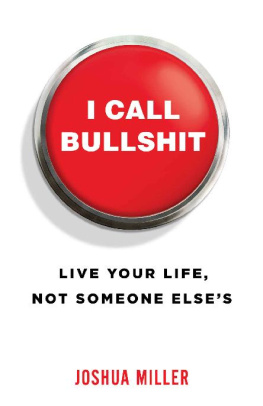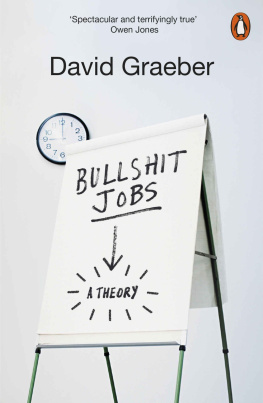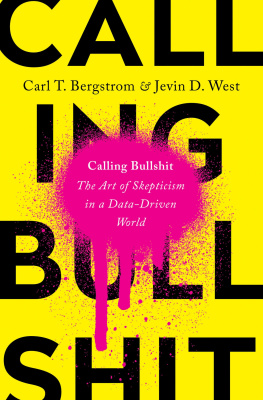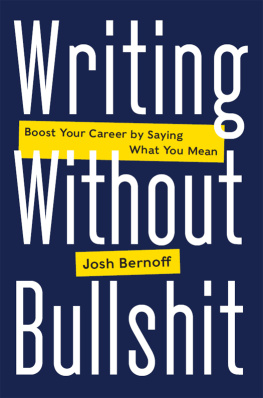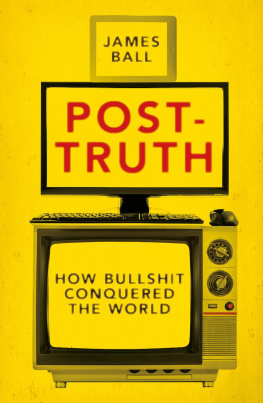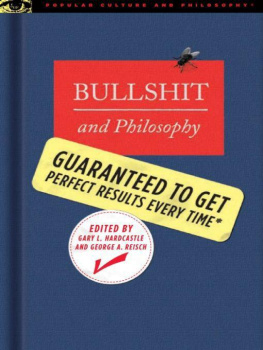
Table of Contents
Popular Culture and Philosophy
Series Editor: George A. Reisch
VOLUME 1
Seinfeld and Philosophy: A Book about Everything and Nothing (2000)
Edited by William Irwin
VOLUME 2
The Simpsons and Philosophy: The Doh! of Homer (2001) Edited by William Irwin, Mark T. Conard, and Aeon J. Skoble
VOLUME 3
The Matrix and Philosophy: Welcome to the Desert of the Real (2002) Edited by William Irwin
VOLUME 4
Buffy the Vampire Slayer and Philosophy: Fear and Trembling in Sunnydale (2003) Edited by James B. South
VOLUME 5
The Lord of the Rings and Philosophy: One Book to Rule Them All (2003) Edited by Gregory Bassham and Eric Bronson
VOLUME 6
Baseball and Philosophy: Thinking Outside the Batters Box (2004) Edited by Eric Bronson
VOLUME 7
The Sopranos and Philosophy: I Kill Therefore I Am (2004) Edited by Richard Greene and Peter Vernezze
VOLUME 8
Woody Allen and Philosophy: You Mean My Whole Fallacy Is Wrong? (2004) Edited by Mark T. Conard and Aeon J. Skoble
VOLUME 9
Harry Potter and Philosophy: If Aristotle Ran Hogwarts (2004) Edited by David Baggett and Shawn E. Klein
VOLUME 10
Mel Gibsons Passion and Philosophy: The Cross, the Questions, the Controversy (2004) Edited by Jorge J.E. Gracia
VOLUME 11
More Matrix and Philosophy: Revolutions and Reloaded Decoded (2005) Edited by William Irwin
VOLUME 12
Star Wars and Philosophy: More Powerful than You Can Possibly Imagine (2005) Edited by Jason T. Eberl and Kevin S. Decker
VOLUME 13
Superheroes and Philosophy: Truth, Justice, and the Socratic Way (2005) Edited by Tom Morris and Matt Morris
VOLUME 14
The Atkins Diet and Philosophy: Chewing the Fat with Kant and Nietzsche (2005) Edited by Lisa Heldke, Kerri Mommer, and Cynthia Pineo
VOLUME 15
The Chronicles of Narnia and Philosophy: The Lion, the Witch, and the Worldview (2005) Edited by Gregory Bassham and Jerry L. Walls
VOLUME 16
Hip Hop and Philosophy: Rhyme 2 Reason (2005) Edited by Derrick Darby and Tommie Shelby
VOLUME 17
Bob Dylan and Philosophy: Its Alright Ma (Im Only Thinking) (2006) Edited by Peter Vernezze and Carl J. Porter
VOLUME 18
Harley-Davidson and Philosophy: Full-Throttle Aristotle (2006) Edited by Bernard E. Rollin, Carolyn M. Gray, Kerri Mommer, and Cynthia Pineo
VOLUME 19
Monty Python and Philosophy: Nudge Nudge, Think Think! (2006) Edited by Gary L. Hardcastle and George A Reisch
VOLUME 20
Poker and Philosophy: Pocket Rockets and Philosopher Kings (2006) Edited by Eric Bronson
VOLUME 21
U2 and Philosophy: How to Decipher an Atomic Band (2006) Edited by Mark A. Wrathall
VOLUME 22
The Undead and Philosophy: Chicken Soup for the Soulless (2006) Edited by Richard Greene and K. Silem Mohammad
VOLUME 23
James Bond and Philosophy: Questions Are Forever (2006) Edited by Jacob M. Held and James B. South
VOLUME 24
Bullshit and Philosophy: Guaranteed to Get Perfect Results Every Time (2006) Edited by Gary L. Hardcastle and George A. Reisch
VOLUME 25
The Beatles and Philosophy: Nothing You Can Think that Cant Be Thunk (2006) Edited by Michael Baur and Steven Baur
IN PREPARATION:
South Park and Philosophy (2007) Edited by Richard Hanley
Hitchcock and Philosophy (2007) Edited by David Baggett and William Drumin
The Grateful Dead and Philosophy (2007) Edited by Steven Gimbel
On Bullshitmania
GEORGE A. REISCH and GARY L. HARDCASTLE
It was just a book, after alla book written by an Ivy League philosopher, Princetons Harry G. Frankfurt, attempting to clarify a particular concept. That clarification would be achieved, moreover, in an ordinary way, at least for Ivy League philosophers. Philosophical authorities from the past would be cited, quoted, and interpreted; the flaws in their analyses pointed out; and suddenly a concept or term we thought we had understood would be revealed as in fact confused, vague, and murky. Then, at the works intellectual crescendo, a new and clearer interpretation of the concept would emerge for other philosophers to consider and, eventually, tear apart once again. A day in the life of professional philosophy.
But this book was unusual. It was very small, even cute. Sitting on bookstore shelves and display tables, it could easily have been mistaken for a childrens book, or a pocket-size collection of affirmations. The austere, classical style of its cover and its title might rather have suggested an ancient oration or a collection of lyric poems. But the words elegantly printed on the cover did not say On Love, On Poetics, or even, On Truth (and its General Scarcity). They said On Bullshit, and the public loved it.
No other work by a living academic philosopher has been so well received. After twenty-six weeks on The New York Times bestseller list, On Bullshit is poised to sell more copies than any commercial philosophy book, ever. Yes, philosophically themed books like Zen and the Art of Motorcycle Maintenance and Gdel, Escher, Bach were hugely successful. But they were written for wide, popular audiences. On Bullshit , in contrast, circulated for two decades exclusively among professional academic philosophers. Such experts in logic, conceptual analysis and (Frankfurts specialty) moral theory usually have little interest in popular philosophical writings. All the more surprising, then, that on leaving the ivory tower for main street, On Bullshit became such a hit.
Apropos for Today
Why did it happen? One answer, easy and obvious, was suggested by comedian Jon Stewart, host of televisions The Daily Show . Stewart interviewed Frankfurt after the book had become a bestseller. When Frankfurt explained his idea that, unlike the liar, the bullshitter doesnt really care whether what he says is true, the audience erupted in laughter and giggles. I should warn you, Stewart said, leaning in to reassure his startled guest. When they hear that word , it tickles them. Especially coming from an Ivy League Professor, Frankfurt added.
True, that word does not often (or, really, ever ) appear in the title of academic treatises. But this books appeal cannot be fully explained by its cover. Like a sweet little old lady giving someone the finger, the novelty of a minor obscenity quickly gets old. On Bullshit is different. Even for those who may see the book as merely a joke, or a most appropriate gift for an annoying boss or co-worker, it is a joke that seems to have hit a cultural nerve.
As it turns out, Stewart also suggested a deeper, and better, answer. The book, he noted, is very apropos for today. He did not elaborate; he just asked Frankfurt about its origin and joked about whether Frankfurt had his facts right or was just... never mind. Truth is, Stewart didnt need to explain why the book is apropos. There was, as the saying goes, an elephant in the room during that interview. It was the same elephant that haunted Frankfurts other appearances on television and radio. On each occasion it lounged next to Frankfurt and his interviewer, waiting to be named, discussed, or at least acknowledged. Yet not even Stewart, who makes his living with clever, incisive parody of politics and its news coverage, mentioned explicitly why it is that On Bullshit is very apropos for today.
The elephant was, of course, a war. Like most others in United States history, it sharply divided popular opinion. But this war was highly unusual, too. Its supporters as well as its critics came to agree that the official reasons for waging it, the ones put to the public, to Congress, and to the United States allies, turned out to be... well, put it this way: the claims that once seemed to make the invasion of Iraq necessary and urgentthat Iraq possessed and planned to use nuclear and chemical weapons of mass destruction, that it had high-technology devices (such as remote controlled airplanes) for deploying those weapons, and that it was complicit in the attacks of September 11th, 2001are now understood to be best described by that word.
Next page
